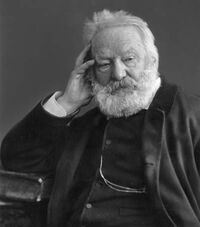
1884 photograph of Victor Hugo.
Victor Marie Hugo (February 26, 1802 - May 22, 1885) was a prolific French author whose works include novels, plays, essays and poems. In France, he is best known as a poet but in the English-speaking world he is most famous for his two historical fiction novels, The Hunchback of Notre Dame (1831) and Les Misérables (1862).
Biography[]
Hugo was the third son of an unmarried couple, Joseph Leopold Sigisbert Hugo (1774 - 1828) and Sophie Trebuchet (1772 - 1821). Hugo's father was an officer in Napoleon's army and served as governor of a province near Naples, Italy. The family moved frequently to posts in Italy and Spain. Hugo's mother grew tired of constantly moving and settled in Paris in 1803 with her children.

1829 portrait of Victor Hugo by Achille Devéria.
In 1822, Hugo married Adele Foucher (1803 - 1868). They had five children, Leopold, Leopoldine, Charles, Francois-Victor and Adele. Leopold died as a baby. Leopoldine drowned in 1843 at the age of nineteen. Victor Hugo was traveling in the south of France at the time and read about his daughter's accidental death in a newspaper, an experience which he described in his poem A Villequier. Hugo went on to write many more poems about Leopoldine and his loss of her, one of his best known poems, Demain, des l'aube ("Tomorrow, From Dawn"), is about visiting her grave.
Hugo's first novella Han d'Islande ("Han of Iceland") was published in 1823. Five volumes of his poetry appeared between 1829 and 1840. Hugo's first serious work was the 1829 short story "The Last Day of a Condemned Man", based around the character of a real-life murderer who had been executed. The story is an early example of social-consciousness in literature, which would later feature prominently in Hugo's own 1862 novel Les Misérables and in the writings of other 19th century authors, notably Charles Dickens.
The first full length novel by Hugo was The Hunchback of Notre Dame which was published in 1831 and quickly translated into other languages. As a result of its popularity, the City of Paris had to renovate Notre Dame Cathedral, which had fallen into disrepair, because many visitors to Paris wanted to see the building after having read Hugo's novel.
Victor Hugo became involved in politics in the 1840s, being made a member of the Higher Chamber (equivalent to the British House of Lords) by King Louis-Philippe in 1841. He spoke against social injustice and the death penalty and in favor of freedom of the press. After the 1848 Revolution and the founding of the Second Republic in France, Hugo's political career continued as a member of the Constitutional Assembly and the Legislative Assembly.

Photograph of Victor Hugo taken by his son, Charles Hugo, during his exile in Britain in the 1850s.
When Louis Napoleon Bonaparte seized power and declared himself Emperor Napoleon III, Hugo openly called him a traitor and went into exile, first in Belgium and later in the United Kingdom. Hugo settled on the island of Guernsey, where he remained until 1870 and continued to write pamphlets critical of Napoleon III and his regime.
Hugo returned to France following the foundation of the Third Republic in 1870 and was elected to the National Assembly and the Senate. During the 1870 Siege of Paris by the Prussian army, due to a lack of food, Hugo famously had to eat the corpses of animals supplied to him by the Paris zoo, writing that he had become reduced to eating the unknown. Hugo briefly returned to Guernsey in 1872 before settling permanently in France in 1873.
In 1878, Hugo founded an organization for the protection of writers' and artists' copyright. The organization's ideas would form the basis of the Berne Convention on Copyright eight years later. However, Hugo is on record as saying that all works should pass into the public domain immediately after the death of their creators.
More than two million people followed Hugo's funeral procession from the Arc de Triomphe to the Pantheon where he is buried. The avenue where he died is now named after him and nearly every town in France has a street which bears his name.
External links[]
- Works of Victor Hugo in French and English on Wikisource.
- Quotations by and about Victor Hugo in French and English on Wikiquote.
- Free public domain audiobooks of Victor Hugo's works from LibriVox/
